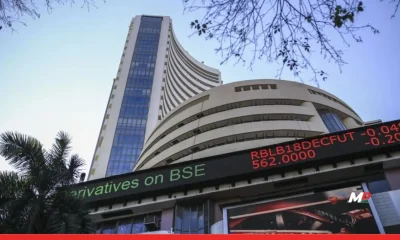Published
6 months agoon

The world of sports is a tapestry woven with tales of triumph and tragedy, where athletes push the boundaries of human potential and leave indelible marks on the hearts and minds of their ardent fans. In the grand spectacle of the Paris Olympics 2024, one such story of resilience and determination emerged, captivating the imagination of an entire nation. This is the story of Manu Bhaker, the young Indian shooter who etched her name in the history books by becoming the first female Indian shooter to win an Olympic medal.
Manu Bhaker’s road to glory
Manu Bhaker’s journey to the Paris Olympics was paved with both triumph and heartbreak. The 22-year-old shooter from Haryana had experienced the agony of disappointment at the 2020 Tokyo Olympics, where her dreams were shattered by a technical malfunction. Undeterred by this setback, Bhaker channeled her determination and honed her skills, setting her sights on redemption in the French capital.
As the Paris Olympics 2024 approached, Bhaker’s focus and dedication were on full display. In the qualification rounds, she showcased her marksmanship prowess, finishing third with a score of 580, salvaging an otherwise challenging day for the Indian shooting contingent. Her performance was a testament to her resilience, as she navigated the pressure-filled environment with poise and precision.
The women’s 10m air pistol final was a nail-biting affair, with Bhaker locked in a fierce battle with her Korean counterparts. Trailing the leaders by a mere 0.1 points heading into the final shot, Bhaker’s nerves of steel were put to the test. In a moment that will be etched in the annals of Indian sporting history, the young shooter found the strength within to deliver a 10.3 on her final attempt, clinching the Bronze medal and becoming the first Indian woman to win a shooting medal at the Olympics.
Inspiration from the Bhagavad Gita
As Bhaker stood on the podium, her eyes shone with a mix of triumph and humility. In a heartwarming moment, she later revealed that her performance was fueled by the wisdom of the Bhagavad Gita, the ancient Hindu scripture that has long been a source of inspiration for countless individuals.
Bhaker shared that throughout the final, the words of the Gita were her constant companion, guiding her actions and shaping her mindset. “Honestly, I read a lot of Gita. So what was going through my mind is just do what you are meant to do. Just do what you are supposed to do and just leave. Whatever the destiny, you can’t control the outcome of it,” she later said, echoing the Gita’s teachings on the importance of focusing on one’s duty rather than the fruits of one’s actions.
Bhaker’s profound connection to the Bhagavad Gita was evident in her composure and determination during the final. She refused to be consumed by the pressure of the moment, instead channeling her energy into executing her skills with unwavering precision. This philosophical approach, rooted in the Gita’s principles of detachment and equanimity, enabled Bhaker to navigate the high-stakes environment with a clear mind and a steadfast heart.
A momentous milestone for Indian sports
Manu Bhaker’s historic Bronze medal at the Paris Olympics 2024 not only cemented her place in the annals of Indian sporting history but also ignited a renewed sense of pride and optimism among her compatriots. As the nation celebrated her achievement, it became clear that her triumph was more than just a personal victory – it was a testament to the resilience and determination of the entire Indian sports ecosystem.
Bhaker’s medal was the first to be won by an Indian at the Paris Olympics, setting the stage for the nation to surpass its previous record of seven medals from the Tokyo 2020 Games. This achievement was particularly significant, as it demonstrated the ongoing progress and development of Indian sports, with the country’s athletes poised to make an even greater impact on the global stage.
Inspiring the next generation
Manu Bhaker’s success has the potential to ignite a spark of inspiration within the hearts of young Indian athletes, who now see the pinnacle of sporting glory as a tangible dream within their grasp. Her journey, marked by setbacks and triumphs, serves as a powerful reminder that with unwavering dedication and a steadfast belief in oneself, even the most daunting challenges can be overcome.
Manu Bhaker’s bronze medal has the potential to reverberate far beyond the confines of the shooting range, serving as a catalyst for broader societal change and empowerment. Bhaker’s achievement as the first female Indian shooter to win an Olympic medal is a significant milestone in the ongoing journey towards gender parity in Indian sports. Her success shatters stereotypes and inspires young girls across the country to pursue their athletic dreams, knowing that they too can ascend to the highest echelons of international competition.
A legacy of inspiration and grit
Manu Bhaker’s historic Bronze medal at the Paris Olympics 2024 is more than just a singular achievement; it is a testament to the transformative power of the human spirit. Through her journey, marked by both triumph and adversity, Bhaker has emerged as a beacon of inspiration, a role model whose legacy will continue to inspire generations of Indian athletes to come.
As the nation celebrates her accomplishment, it is clear that Manu Bhaker’s story is not just about a single medal, but about the indomitable spirit that lies at the heart of the Indian sporting landscape.
In the years to come, Manu Bhaker’s name will be etched in the annals of Indian sporting history, a shining example of what can be achieved when the human spirit is unleashed. Her legacy will continue to inspire, motivate, and empower generations of Indian athletes, pushing them to reach for the stars and redefine the boundaries of what is possible.


SpaceTech startup OrbitAID raises $1.5 Million in Pre-Seed round led by Unicorn India Ventures


Projected salary increases in India signal optimistic outlook for 2025, according to Mercer


Baat Bharat Ki, with Shri Suresh Prabhu | EP 1 of 2


Driving Digital Change: The 33rd Digital Transformation Summit to Shape India’s $1 Trillion Digital Market


Indian Stock Market Crashes: Weak Rupee, Budget Woes, and US Jobs Data Shake Investor Confidence


CXO Moves: Major Executive Appointments You Need to Know

